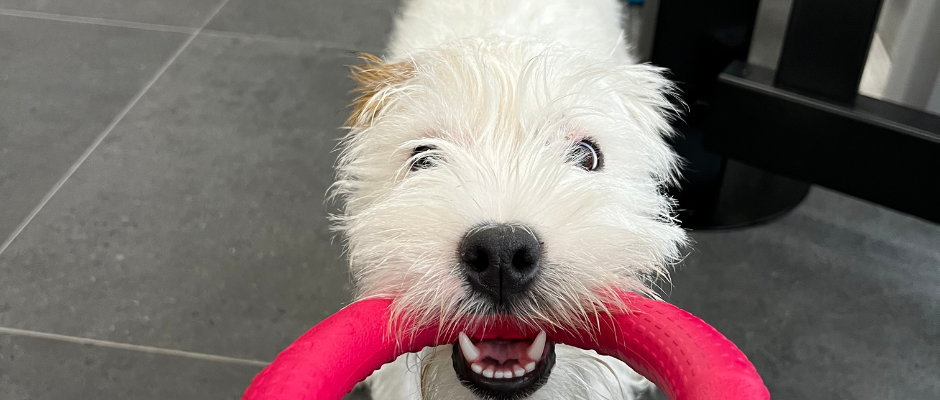
Mouthing and Biting in Puppies
It is normal puppy behaviour to bite at each other when they play. By trial and error, they are quick to learn just how rough they can play with each other before it becomes too rough, and they need to adjust their behaviour accordingly.
When two puppies are playing together and one bites the other too hard, the other will yelp loudly and put a halt to the play by walking away. When play resumes, it will be gentler and proceed for longer. By playing the part of the “other puppy” we can teach our pups to bite “gently” or not at all.
7 Stages of Bite Strength
A dog has seven stages of bite strength from mouthing to a full force bite. It is very important that we teach our puppy to mouth gently rather than to inhibit the mouthing reflex completely. The puppy that doesn’t learn to control the strength of his bite will one day be in the predicament where he is in extreme pain or very scared and will invariably snap or bite with full strength. The puppy who knows how to control the force of his bite is more likely to give a gentle warning nip.
.png)
Fun Ways to Teach Your Pup Gentle Play!
So, when you are playing with your pup, encourage him to mouth your hands - GENTLY. As soon as he bites harder, use a high-pitched voice and yell “OUCH”, then move away and stop play for a few minutes. When you resume play, test your puppy’s response. If you have a very confident puppy who keeps trying to bite you, thinking it is a game, stop it immediately. You do this by holding your puppy still, making eye contact with him and in a very stern voice say “NO”. Keep staring at your puppy until he looks away - (this helps your puppy to learn that you are the boss) - then loosen your hold on him, ask him to do something he knows, like sit, and reward him immediately.
Puppy Time-Out
It may be necessary to use the “time-out” method to help convince your pup that he is being naughty and should not repeat that behaviour.
When using this technique, it is very important that you are consistent and persistent. Don’t allow him to bite or play roughly on one instance and then try to stop him on another. This will cause confusion and make the learning process a lot longer.
.png)
Use Toys Instead of Hands
A final tip to manage biting or nipping is to use a toy for redirection. Avoid playing around the dog's face with your hands, as it might unintentionally teach them to nip at hands.
Additionally, hand-feed all their food to prevent them from associating hands with play helping them understand that food comes from the hands and it is not a play-toy.
VetLand's Puppy Academy, is so much more than daycare for puppies. Crafted by our expert veterinarians to nurture your pup's confidence and social skills, puppies learn how to play safely, and build their confidence with other pups, the puppy carers, and the world around them.




.jpg?width=352&name=New%20Project%20(2).jpg)